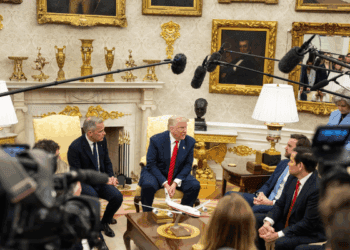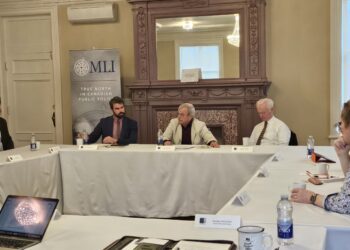 It should take more than a simply majority to break up a country, writes Macdonald-Laurier Institute Managing Director Brian Lee Crowley for CapX.
It should take more than a simply majority to break up a country, writes Macdonald-Laurier Institute Managing Director Brian Lee Crowley for CapX.
By Brian Lee Crowley, Nov. 12, 2015
Restive regions like Scotland and Catalonia are putting the continued existence of major European countries in question. There could be many serious consequences, not only for the divorcing nations, but for other countries faced with disaffected regional minorities.
For these and many other reasons it is time to think more deeply about the procedure that ought to be recognised as legitimate and definitive in deciding whether one part of a country can declare independence.
Many people will find this question strange. After all are we not worldly and sophisticated democracies? And in such societies is it not obvious that such questions are settled by simple majority vote in a referendum along the lines of the recent Scottish vote?
Actually nothing could be less obvious, as Canada has learned from its 50 year experience with the Quebec secessionist movement, including two referendums on various schemes for independence.
Canada’s experience is obviously not binding on other countries. On the other hand, Canada has now started to create the ideas and institutions that, while fully respectful of democracy, have correctly raised the bar for secession far higher than a simple majority vote at referendum time.
There could scarcely be a more central constitutional and political question than the country to which you belong.
When the question of how the separation of Quebec could be accomplished was put to Canada’s Supreme Court (SCC), the justices wisely recalled that democracy is part of a complex web of values. We cannot simply pick and choose the piece that pleases us (simple majority voting) and ignore the parts that are inconvenient (like obeying the law, respecting the constitution and protecting minority rights).
In Canada’s case at least, the SCC found that for secession to be legitimate and democratic, a referendum was clearly insufficient. All a referendum could be expected to do was to establish that a province had a right to put its case for secession and to expect that negotiations in good faith would be opened. Moreover there were to be rules about both the referendum question and the strength of the vote in favour of secession needed in order to trigger the obligation to negotiate. First on the list: a clear majority answering yes to a clear question on secession.
As others have pointed out, if the judges meant a “simple majority,” they just had to say so. They didn’t. They said a “clear majority.” It doesn’t require a Jesuitical mind to find that the legal requirement must therefore be something more than just 50 per cent plus one of those voting.
Nor is there anything anti-democratic in the court’s rule. People who think otherwise are confusing two very different kinds of decision rules.
Some democratic decisions are made with a lot less than 50 per cent plus one. Some of them are very important, such as elections. As everybody knows, you can win elections in most Western democracies with a lot less than half the vote.
But there is a reason for that; an election cannot result in no decision (although it can certainly result in hung parliaments). Somebody has to govern, and the least objectionable way to pick who should rule is to choose the party acceptable to the largest number of people. The fact that a majority of people may have preferred someone else is irrelevant.
But the fact that we accept that outcome, that we might be governed by a party supported by only a minority of the population, is itself dependent on other fundamental rules of fairness. For example, that all qualified citizens get a vote, that the decisions governments can make are subject to protections for minority rights, and that governments are answerable before independent courts for their behaviour.
These things are so fundamental to fairness and legitimacy that most countries don’t permit mere governments or even electoral majorities to change them on their own. We require big majorities before we allow these “rules of the game” to be altered. In most democracies amendments to the Constitution, for example, usually require some kind of “super-majority” or parliamentary and popular approval.
There could scarcely be a more central constitutional and political question than the country to which you belong. Thousands of everyday decisions such as where you will live, what property you own, how your relationships are arranged, the rights and obligations you enjoy at work, before the courts and in your trade union, all are shaped by the institutions, history and culture of the country under whose laws and traditions you live. Even those who wish their region to be a separate country have nonetheless made their lives under the known rules of the national status quo, which is why there is a strong presumption in favour of its protection. That presumption can be overcome, but the case for it to be overturned by a simple majority of those who happened to turn out in a referendum is very weak indeed.
Furthermore, it is not just those living in the would-be nation who are affected by secession, but also those living in the rest of the country. That was why the Supreme Court of Canada correctly ruled that a referendum can do no more than create an obligation on the rest of the country to sit down and negotiate. If the secessionist region has a right to pursue its national interest, it does not trump the right of the country being rejected from doing the same on a wide range of issues, including sharing of the national debt and assets, management of natural resources, use of passports and currency, dual citizenship and more.
A genuinely democratic approach to secession, then, offers no simple path to the nationalist nirvana.
Similarly, democracy’s commitment to the protection of minorities is also engaged by secession referendums. The most notable such minority is composed of those citizens who reject secession. There is no reason to think that a simple majority in a secession vote removes the rights of the dissenting minority; furthermore if the larger nation can be dismembered, so too can the smaller. If, say, Dumfries and Galloway voted to remain within the UK, London would have every right to make that a condition of Scottish independence.
Finally, in order for secession to be democratically legitimate and achieve international recognition, it must respect the rule of law. Canada’s written constitution is silent on secession and the departure of a province would necessitate a constitutional amendment, requiring a high degree of national agreement and hence a high degree of bargaining power by the rest of the country. It is highly likely that the divorce settlement that would result from such negotiations would be far different from the pie-in-the-sky promises of most nationalist movements.
A genuinely democratic approach to secession, then, offers no simple path to the nationalist nirvana. It requires a referendum on a clear question that results in a clear majority for the Yes but that is only the beginning, not the end, of a complicated process of negotiation whose outcome is unforeseeable.
The advice from Canada? Spend less time thinking about how to win over nationalist minorities with concessions, and more about the fair and democratic rules and institutions that will make it clear the price of independence is almost certainly not worth paying.
Brian Lee Crowley (twitter.com/brianleecrowley) is the Managing Director of the Macdonald-Laurier Institute, an independent non-partisan public policy think tank in Ottawa: www.macdonaldlaurier.ca.




